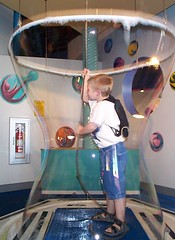Patients who became medical milestones
| By Jane Elliott BBC News, Health reporter |
A quarter of a century might separate two Great Ormond Street patients - but both mark very special milestones in the hospital's history. 
Andrew Williams, now 27, was the first to have a bone marrow transplant (BMT) at the world renowned children's hospital.
Joshua Perry-Pope, now aged two, became the 1,000th to have the procedure.
Dr Paul Veys, bone marrow transplant consultant at Great Ormond Street, said there had been massive steps forward in the period between Andrew and Josh's life-saving treatments.
Changes
"When we first started doing bone marrow transplants it was very scary. When we look back we used to lose as many as we saved and we had about a 50% survival rate.
"Now we do about 70 BMTs a year and 60 of the children go home."
![]()
![]() When we look back we used to lose as many as we saved
When we look back we used to lose as many as we saved ![]()
Dr Veys said medical advances in chemotherapy treatment had helped more patients to survive.
The advent of the bone marrow register had also had a significant impact, because it had enabled doctors to match up many more patients with suitable donors.
But he said there was still a poorer survival rate among ethnic minority groups because too few donors from these communities are joining the register.
Specialist Maria Finch agreed: "Unfortunately only 30% of our patients find a matched BMT donor from within their own family; therefore the majority of donors come from people who have placed themselves on a volunteer register.
"The registries urgently need more people aged 18-40 to join, in particular young male donors and those from minority ethnic backgrounds."
First
Gill Williams said she and husband Bryan had few doubts when they agreed Andrew could have Great Ormond Street's first BMT.
They were told that their four-month-old son had severe combined immune deficiency (SCID) and without a BMT he would die.
"It was very unreal; it was just like a film. We knew right from the start that it was the only treatment that was available.
"The only difficulty we faced was because our other son was also involved (he was the donor). But we explained about it as well to him as we could as he was only three at the time."
Progress
Gill continued to breast-feed Andrew to give him the best natural immunity she could.
He had the transplant and suffered a series of setbacks due to the onset of graft versus host disease - where the donor cells realise they are in an alien body and fight it.
![]()
![]() I realise how lucky I am to be here
I realise how lucky I am to be here ![]()
But Andrew, from Woking, recovered and was allowed home three months later.
Andrew said he would always be grateful for his second chance.
"I was too young to remember my experience as a patient and the BMT, but I realise how lucky I am to be here.
"Now this procedure is very common, but as I was the first at GOSH nobody knew very much about it.
"Until you get much older you do not realise how lucky you have been."
He said that apart from the initial set-backs he had remained remarkably healthy.
Recent
Joshua Perry Pope, from Hampshire, was diagnosed with acute myeloid leukaemia in June 2005 and was successfully treated with chemotherapy.
His mother Louise explained: "All you think about is going forward and we started to live a normal life and we were just scheduled to come back for check-ups.
"Our aim was to be home for Christmas and this had given us something to focus on and look forward to.
"You cling on to anything positive.
"This really felt like that was the hardest time in my life and now things were going to be normal."
Just before Christmas Louise gave birth again and Josh was allowed home to celebrate.
But six months later his condition had deteriorated and doctors confirmed he had relapsed. He had more bouts of chemotherapy and doctors scheduled a BMT, which was a successful process.
"You live it all the time," said Louise. "If he gets a temperature we have to go the local hospital and we have been in hospital four times since the BMT."
Initially the family made weekly visits to Great Ormond Street, but now these are monthly and they are hoping Josh can start playschool in September.
"There are days when you do have your ups and downs, but I need to be strong for Josh.
"We did get the option not to carry on the treatment, but we would not have done anything different," said Louise.Linkback URL: http://news.bbc.co.uk/1/hi/health/6455191.stm


